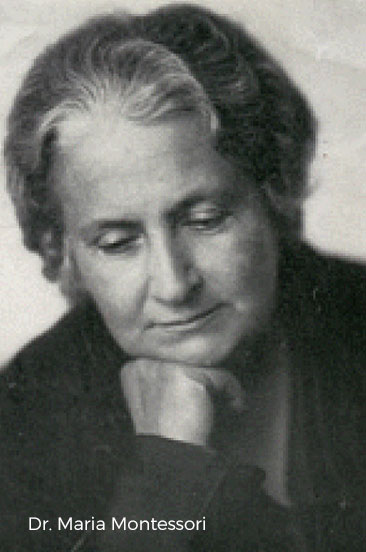What is Montessori?

The Montessori Method is a world-renowned educational methodology aimed at developing and maximizing the one-of-a-kind potential your child was born with.
It was first developed by Maria Montessori (1870-1952), an Italian physician and anthropologist who strongly believed that a child’s early years set the stage for the rest of their life.
And it was for this reason that she sought to develop a revolutionary teaching method (backed by modern neuropsychology research) that would become highly praised and recognized internationally.
So what makes the Montessori Method so appealing to parents and child caregivers all over the world?
Well, unlike most traditional educational or schooling methods, it’s not based around getting your child to memorize facts, carry out assignments, and perform on standardized tests.
Maria Montessori knew that a one-size-fits-all approach would never be anywhere near as powerful as one that’s custom-fitted to YOUR child’s natural strengths, interests, and motivations.
How The Montessori Method Works
Take a single glance into a Montessori classroom and you’ll quickly realize that it’s not about forcing subjects, activities, and assignments onto your child.
Rather, it’s about giving your child the FREEDOM to choose the activities they’re most naturally drawn to.
That’s because children are naturally driven to experience their surroundings through the use of their senses.
This is why you see babies put objects into their mouths, stare at a speaking person’s lips, and touch everything they can get their hands on (regardless of how many times you say “no”).
By obeying these subconscious impulses, young children are actually perfecting physical abilities and establishing the very mental connections that will help them become functioning and successful human beings.
Unfortunately, what traditional schooling methods don’t realize is that we can’t force a child of any age to be driven towards a physical or intellectual activity they’re not developmentally ready for.
For example, we can’t force a child to walk or talk if their body hasn’t achieved the necessary physical and mental milestones.
Removing Obstacles to Development
What many parents don’t realize is that we can (and many times unknowingly do) create obstacles that get in the way of the child’s drive – and therefore slow down or even stop their development.
For example, a mother might think that by putting a child in a crib or playpen she’s protecting him from dangers found around the home. But in reality, she’s actually preventing him from following his drive to move around – and engage with – his environment.
And research shows that cutting off a child’s development at any stage can have great repercussions on their future cognitive growth and self-esteem.
This isn’t something that most contemporary schools take into account. And that’s where the Montessori Method differs.
The Montessori Parenting Difference
Contrary to what some people believe, Montessori is not about letting children do whatever they want.
Rather, it’s about aiding their development by creating an environment where they’re free to flourish according to nature’s plan.
The focus is to let your child make their own choices based on internal motivation instead of force-fitting them into roles, subjects, and curriculums that they aren’t meant for.
And the results are nothing short of astounding.
Children who are free to safely follow their drives and develop the way nature intended are joyful and peaceful children. They’re able to gain a deeper understanding of themselves and their capabilities, become accountable, and develop a strong, driven, and independent sense of self.
This is where parents and caregivers such as you and I can make a tremendous impact.
If you’re ready to bring the Montessori approach into your own home to begin nurturing your child’s full potential, let’s work together to make it happen.
